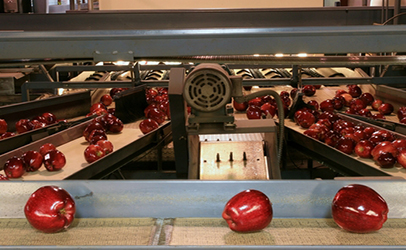 rking Group (EWG) is calling on the U.S. Environmental Protection Agency (EPA) to halt use of a pesticide commonly applied to conventionally grown apples to limit storage damage until EPA has done further safety studies.
rking Group (EWG) is calling on the U.S. Environmental Protection Agency (EPA) to halt use of a pesticide commonly applied to conventionally grown apples to limit storage damage until EPA has done further safety studies.EWG’s president, Ken Cook, wrote EPA on Thursday asking that the agency launch a new investigation to determine whether the use of diphenylamine, or DPA, is safe for U.S. consumers who, according to 2010 industry data, use about 42.5 pounds of apple products per person each year.
Cook’s letter to Steven Bradbury, head of EPA’s Office of Pesticide Programs, stated that, as part of its inquiry, the agency “must demand that the pesticide’s manufacturers collect and disclose rigorous data that can determine whether nitrosamines or other potentially toxic chemicals form when raw fruits are coated with DPA and stored over long periods or are processed into juices or sauces.”
The letter concluded, “The American public deserves the same level of protection as Europeans from pesticide risks. We urge EPA to halt the use of DPA on U.S. fruit until a rigorous analysis by EPA of the chemical can prove that it poses a reasonable certainty of no harm to consumers.”
Applying DPA to European apples and pears was banned by the European Commission in 2012, citing lack of sufficient safety data from the manufacturers, and, since March of this year, the European Union will only allow importation of conventionally grown U.S. apples if detectable DPA levels are 0.1 parts per million or below.
In 2010, the U.S. Department of Agriculture found measurable levels of DPA on 82.7 percent of the raw, conventionally grown apples tested and at average concentrations four times the EU import limit. The EPA tolerance level for DPA is 10 ppm.
DPA is typically applied to the fruit by dipping, drenching or spraying after it’s picked to help prevent “storage scald,” a blackening or browning of the skin that can occur on apples held in cold storage for months after the fall harvest. While it’s officially regulated as a pesticide, DPA functions as a fungicide and growth regulator.
According to an analysis prepared by EWG Senior Scientist Sonya Lunder, EPA has not examined DPA’s health and safety aspects since 1998, although the 1996 Food Quality Protection Act requires the agency to do so every 15 years.
She said the organization’s major health and safety concern with DPA relates to nitrosamines, a family of chemicals known to cause cancer.
“People who eat nitrosamines have higher levels of cancers. These contaminants are known by EPA and other agencies to be something we want to avoid,” Lunder told Food Safety News.
“Given how often people are eating apples, this is a practice that is not safe,” she added. “We want answers, and we’re not going to get them unless EPA orders them to be generated and conclusive.”
EWG’s recent contacts with EPA indicated that agency scientists were unaware of the EU’s concerns about DPA, Lunder noted. In general, she said, European regulators are quicker to act on available health and safety data and restrict products than their American counterparts.
“Right now, there’s not data available to prove that [DPA is] safe. The European approach of getting the product off the market until it’s proven that it’s safe seems like the reasonable approach to us,” Lunder said.
The Alliance for Food and Farming (AFF), an industry-linked group based in Watsonville, CA, released a statement Thursday “urging caution” about EWG’s claims regarding apples and DPA.
“EWG is once again scaring consumers about an extremely safe and healthy product that parents should be feeding their children more of for good health,” said Marilyn Dolan, AFF’s executive director.
Jim Bair, president and CEO of the U.S. Apple Association (USApple) called the EWG report “misleading” and stated that there was “no credible reason to question EPA’s strict scientific review process.”
“In fact,” Bair continued, “only two months ago EPA said, ‘the newest data confirm that pesticide residues in food do not pose a safety concern for Americans.’ That’s great news.”
“There’s absolutely no issue of safety here whatsoever,” said Wendy Brannen, director of consumer health and public relations for USApple. “EWG puts out this data that is meant to startle and alarm consumers, but what people really need to understand is that DPA levels found on apples are far below the levels set by EPA.”
She said that, while the U.S. apple industry is concerned about the EU’s move limiting acceptable DPA levels on the conventionally grown apples we export, the European market represents only about 1.7 percent of total U.S. apple exports.
“Is it something that we’re happy about? Certainly not. We hate to lose any of our export partners, but the thing with food safety is that any rules have to be grounded in sound science, and there’s a question with the EU whether the science is sound,” Brannen said.
There are about 7,500 apple growers across the U.S., who produce nearly 100 varieties of the fruit in every state, although Washington state is the top producer. Apples are considered one of the most valuable crops grown in the U.S., and we are the world’s second-largest apple producer after China.







